Goslings (9)
By:
November 2, 2012
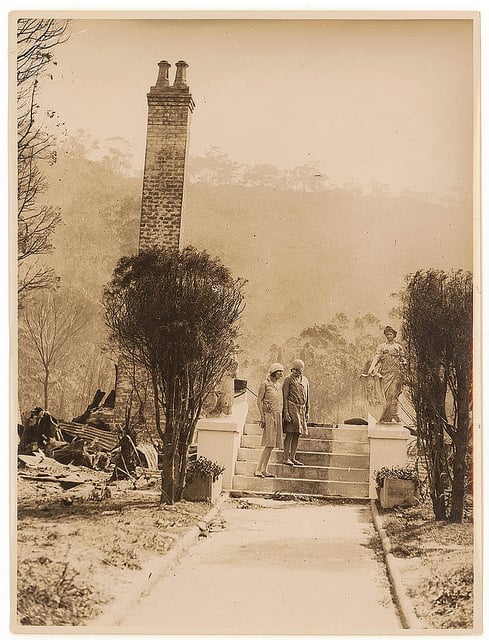
HILOBROW is pleased to present the ninth installment of our serialization of J.D. Beresford’s Goslings (also known as A World of Women). New installments will appear each Friday for 23 weeks.
When a plague kills off most of England’s male population, the proper bourgeois Mr. Gosling abandons his family for a life of lechery. His daughters — who have never been permitted to learn self-reliance — in turn escape London for the countryside, where they find meaningful roles in a female-dominated agricultural commune. That is, until the Goslings’ idyll is threatened by their elders’ prejudices about free love!
J.D. Beresford’s friend the poet and novelist Walter de la Mare consulted on Goslings, which was first published in 1913. In May 2013, HiLoBooks will publish a beautiful new edition of the book. “A fantastic commentary upon life,” wrote W.L. George in The Bookman (1914). “Mr. Beresford possesses the rare gift of divination,” wrote The Living Age (1916). “It is piece of the most vivid imaginative realism, as well as a challenge to our vaunted civilization.” “At once a postapocalyptic adventure, a comedy of manners, and a tract on sexual and social equality, Goslings is by turns funny, horrifying, and politically stirring,” says Benjamin Kunkel in a blurb for HiLoBooks. “Most remarkable of all may be that it has not yet been recognized as a classic.”
SUBSCRIBE to HILOBROW’s serialized fiction via RSS.
ALL EXCERPTS: 1 | 2 | 3 | 4 | 5 | 6 | 7 | 8 | 9 | 10 | 11 | 12 | 13 | 14 | 15 | 16 | 17 | 18 | 19 | 20 | 21 | 22 | 23
5
Nothing but the failure of the water could have driven them from Wisteria Grove. Half-a-dozen times every day Gosling would climb up to the top of the house to reassure himself. And at last came the day when a dreadful silence reigned under the slates, when no delicious tinkle of water gave promise of maintained security from water famine.
“It’ll come on again at night,” said Gosling to himself. “We’ll ’ave to be careful, that’s all.”
He went downstairs and issued orders that no more water was to be drawn that day.
“Well, we must wash up the breakfast things,” was his wife’s reply.
“You mustn’t wash up nothing,” said Gosling, “not one blessed thing. It’s better to go dirty than die o’ thirst. Hevery drop o’ the water in that cistern must be saved for drinkin’.”
Mrs Gosling noisily put down the kettle she was holding. “Oh! very well, my lord!” she remarked, sarcastically. She looked at her two daughters with a twist of her mouth. There were only two sides in that house; the women were as yet united against the common foe.
When Gosling, fatuously convinced of his authority, had gone, his wife quietly filled the kettle and proceeded with her washing up.
“Your father thinks ’e knows everything these days,” remarked the mother to her allies.
There was much whispering for some time.
Gosling spent most of the day in the roof, but not until the afternoon did he realize that the cistern was slowly being emptied. His first thought was that one of the pipes leaked, his second that it was time to make a demonstration of force. He found a walking-stick in the hall….
But even when that precious half-cistern of water was only called upon to supply the needs of thirst, and the Goslings, sinking further into the degradation of savagedom, slunk furtive and filthy about the gloomy house, it became evident that a move must be made sooner or later. Two alternatives were presented: they might go north and east to the Lea, or south to the Thames.
Gosling chose the South. He knew Putney; he had been born there. He knew nothing of Clapton and its neighbourhood.
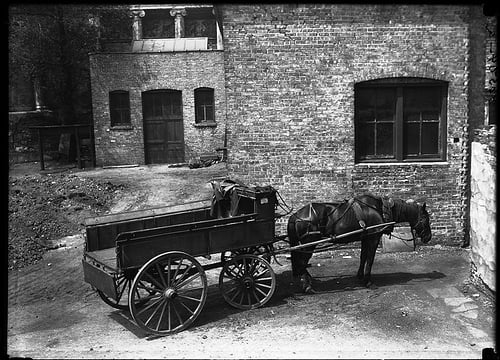
So one bright, clear day at the end of May, the Goslings set out on their great trek. The head of the house, driven desperate by fear of thirst, raided his late partner’s coal sheds and found one living horse and several dead ones. The living horse was partly revived by water from an adjacent butt, and the next day it was harnessed to a coal cart and commandeered to convey the Goslings’ provisions to Putney. It died half-a-mile short of their destination, but they were able, by the exercise of their united strength, to get the cart and its burden down to the river.
They found an empty house without difficulty, but they had an unpleasant half-hour in removing what remained of one of the previous occupants. Gosling hoped it was not a case of plague. As the body was that of a woman, and terribly emaciated, there were some grounds for his optimism.
Gosling was in a state of some bewilderment. When water had been fetched in buckets from the river, and the three women had explored, criticized and sniffed over their new home somewhat in the manner of strange cats, the head of the house settled down to a cigar and a careful consideration of his perplexities.
In the first place, he wondered why those horses of Boost’s had not been used for food; in the second, he wondered why he had not seen a single man during the whole of the long trek from Brondesbury to Putney. By degrees an unbelievable explanation presented itself: no men were left. He remembered that the few needy-looking women he had seen had looked at him curiously; in retrospect he fancied their regard had had some quality of amazement. Gosling scratched the bristles of his ten-days’-old beard and smoked thoughtfully. He almost regretted that he had stared so fiercely and threateningly at every chance woman they had seen; he might have got some news. But the whole journey had been conducted in a spirit of fear; they had been defending their food, their lives; they had been primitive creatures ready to fight desperately at the smallest provocation.
“No man left,” said Gosling to himself, and was not convinced. If that indeed were the solution of his perplexity, he was faced with an awful corollary; his own time would come. He thought of Barbican, E.C., of Flack, of Messrs Barker and Prince, of the office staff, and the office itself. He had not been able to rid his mind of the idea that in a few weeks he would be back in the City again. He had several times rehearsed his surprise when he should be told of the depredations in the warehouse; he had wondered only yesterday if he dared go to the office in his beard.
But to-night the change of circumstance, the breaking up of old associations, was opening his eyes to new horizons. There might never be an office again for him to go to. If he survived — and he was distinctly hopeful on that score he might be almost the only man left in London; there might not be more than a few thousand in the whole of England, in Europe….
For a time he dwelt on this fantastic vision. Who would do the work? What work would there be to do?
“Got to get food,” murmured Gosling, and wondered vaguely how food was “got” when there were no shops, no warehouses, no foreign agents. His mind turned chiefly to meat, since that had been his trade. “’Ave to rear sheep and cattle, I suppose,” said Gosling. As an afterthought he added: “An’ grow wheat.”
He sighed heavily. He realized that he had no knowledge on the subject of rearing cattle and growing wheat; he also realized that he was craving for ordinary food again milk, eggs, and fresh vegetables. He had a nasty-looking place on his leg which he rightly attributed to unwholesome diet.
6
After forty-eight hours’ residence in the new house, Gosling began to pluck up his courage and to dare the perils of the streets. He was beginning to have faith in his luck, to believe that the plague had passed away and left him untouched.
And as day succeeded day he ventured further afield; he went in search of milk, eggs and vegetables, but he only found young nettles, which he brought home and helped to eat when they had been boiled over a wood fire. They were all glad to eat nettles, and were the better for them. Occasionally he met women on these excursions, and stayed to talk to them. Always they had the same tale to tell — their men were dead, and themselves dying of starvation.
One day at the beginning of June he went as far as Petersham, and there at the door of a farmhouse he saw a fine, tall young woman. She was such a contrast to the women he usually met on his expeditions that he paused and regarded her with curiosity.
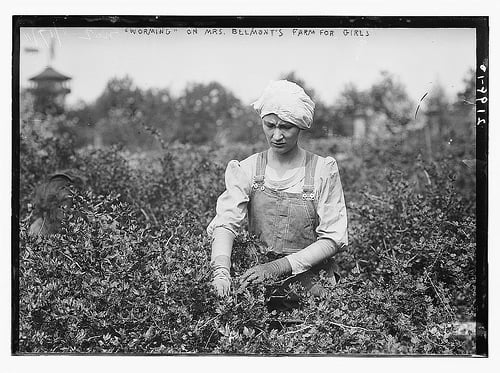
“What do you want?” asked the young woman, suspiciously.
“I suppose you ’aven’t any milk or butter or eggs to sell?” asked Gosling.
“Sell?” echoed the girl, contemptuously. “What ’ave you got to give us as is worth food?”
“Well, money,” replied Gosling.
“Money!” came the echo again. “What’s the good of money when there’s nothing to buy with it? I wouldn’t sell you eggs at a pound apiece.”
Gosling scratched his beard it looked quite like a beard by this time. “Rum go, ain’t it?” he asked, and smiled.
His new acquaintance looked him up and down, and then smiled in return, “You’re right,” she said. “You’re the first man I’ve seen since father died, a month back.”
“’Oo’s livin’ with you?” asked Gosling, pointing to the house.
“Mother and sister, that’s all.”
“’Ard work for you to get a livin’, I suppose?”
“So, so. We’re used to farm-work. The trouble’s to keep the other women off.”
“Ah!” replied Gosling reflectively, and the two looked at one another again.
“You ’ungry?” asked the girl.
“Not to speak of,” replied Gosling. “But I’m fair pinin’ for a change o’ diet. Been livin’ on tinned things for five weeks or more.”
“Come in and have an egg,” said the girl.
“Thank you,” said Gosling, “I will, with pleasure.”
They grew friendly over that meal two eggs and a glass of milk. He ate the eggs with butter, but there was no bread. It seemed that the young woman’s mother and sister were at work on the farm, but that one of them had always to stay at home and keep guard.
They discussed the great change that had come over England, and wondered what would be the end of it; and after a little time, Gosling began to look at the girl with a new expression in his pale blue eyes.
“Ah! Hevrything’s changed,” he said. “Nothin’ won’t be the same any more, as far as we can see. There’s no neighbours now, f’rinstance, and no talk of what’s going on — or anythin’.”
The girl looked at him thoughtfully. “What we miss is some man to look after the place,” she said. “We’re robbed terrible.”
Gosling had not meant to go as far as that. He was not unprepared for a pleasant flirtation, now that there were no neighbours to report him at home, but the idea that he could ever separate himself permanently from his family had not occurred to him.
“Yes,” he said, “ you want a man about these days.”
“Ever done any farm work?” asked the girl.
Gosling shook his head.
“Well, you’d soon learn,” she went on.
“I must think it over,” said Gosling suddenly. “Shall you be ’ere to-morrow? “
“One of us will,” said the girl.
“Ah! but shall you?”
“Why me?”
“Well, I’ve took a fancy to you.”
“Very kind of you, I’m sure,” said the girl, and laughed.
Gosling kissed her before he left.
He returned the next afternoon and helped to cut and stack sainfoin, and afterwards he watched the young woman milk the cows. It was so late by the time everything was finished that he was persuaded to stay the night.
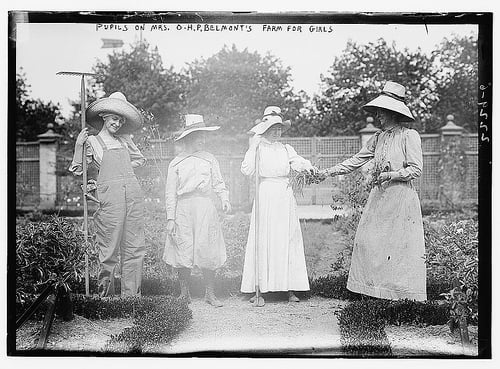
In the new Putney house three women wondered what had happened to “father.” They grew increasingly anxious for some days, and even tried in a feeble way to search for him. By the end of the week they accepted the theory that he too had died of the plague.
They never saw him again.
X
EXODUS
1
In West Hampstead a Jewess, who had once been fat, looked out of the windows of her gaudy house. She was partly dressed in a garish silk neglige. Her face was exceedingly dirty, but the limp, pallid flesh was revealed in those places where she had wiped away her abundant tears. Her body was bruised and stiff, for in a recent raid on a house suspected of containing provisions she had been hardly used by her sister women. She had made the mistake of going out too well dressed; she had imagined that expensive clothes would command respect….
As she looked out she wept again, bewailing her misery. From her earliest youth she had been pampered and spoilt. She had learnt that marriage was her sole object in life, and she had sold herself at a very respectable price. She had received the applause and favour of her family for marrying the man she had chosen as most likely to provide her with the luxury which she regarded as her birthright.
Two days ago she had cooked and eaten the absurdly expensive but diminutive dog upon which she had lavished the only love of which she had been capable. She had wept continuously as she ate her idol, but for the first time she had regretted his littleness.
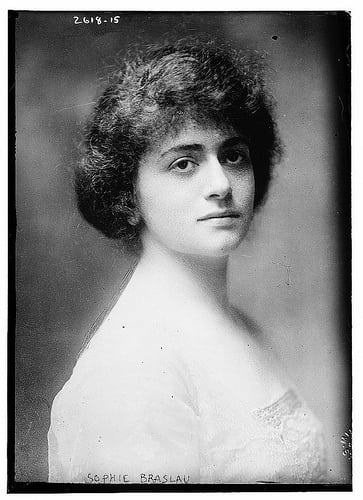
Hunger and thirst were driving her out of the house of which she had been so vain; the primitive pains were awakening in her primitive instincts that had never stirred before. From her window she could see naught but endless streets of brick, stone and asphalt, but beyond that dry, hot, wilderness she knew there were fields — she had seen them out of the corner of her eye when she had motored to Brighton. Fields had never been associated in her mind with food until the strange new stirring of that unsuspected instinct. Food for her meant shops. One went to shops and bought food and bought the best at the lowest price possible. With all her pride of position, she had never hesitated to haggle with shopkeepers. And when the first pinch had come, when her husband had selfishly died of the plague, and her household had deserted her, it was to the shops she had gone, autocratically demanding her rights. She had learned by experience now that she had no longer any rights.
She dressed herself in her least-conspicuous clothes, dabbed her face with powder to cover some of the dirt — there was no water, and in any case she did not feel inclined to wash — carefully stowed away all her money and the best of her jewels in a small leather bag, and set out to find the country where food grew out of the ground. Instinct set her face to the north. She took the road towards Hendon….
2
In every quarter of London, in every great town and city throughout Europe, women were setting their faces towards the country.
By the autumn London was empty. The fallen leaves in park squares and suburban streets were swept into corners by the wind, and when the rain came the leaves clung together and rotted, and so continued the long routine of decay and birth.
When spring came again, Nature returned with delicate, strong hands to claim her own. For hundreds of years she had been defied in the heart of this great, hard, stone place. Her little tentative efforts had been rudely repulsed, no tender thread of grass had been allowed to flourish for an hour under the feet of the crushing multitude. Yet she had fought with a steady persistence that never relaxed a moment’s effort. Whenever men had given her a moment’s opportunity, even in the very heart of that city of burning struggle, she had covered the loathed sterility with grass and flowers, dandelions, charlock, grounsel and other life that men call weeds.
Now, when her full opportunity came, she set to work in her slow, patient way to wreck and cover the defilement of earth. Her winds swept dust into every corner, and her rain turned it into a shallow bed of soil, ready to receive and nurture the tiny seeds that sailed on little feathered wings, or were carried by bird and insect to some quiet refuge in which they might renew life, and, dying, add fertility to the mother who had brought them forth.
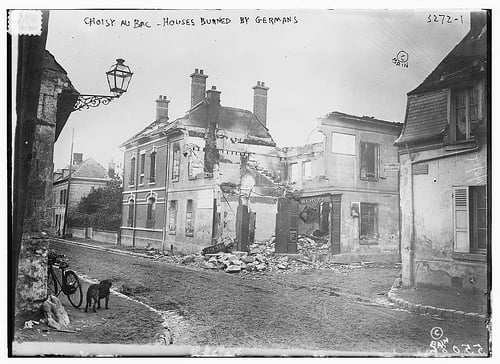
Nature came, also, with her hurricanes, her lightnings and her frosts, to rend and destroy. She stripped slates from roofs, thrust out gables and overturned solid walls. She came with fungi to undermine and with the seeds of trees to split asunder.
She asked for but a few hundred years of patient, continuous work in order to make of London once more a garden; where the nightingale might sing in Oxford Street and the children of a new race pluck sweet wild flowers over the site of the Bank of England….
3
The spirit of London had gone out of her, and her body was crumbling and rotting. There was no life in all that vast sprawl of bricks and mortar; the very dogs and cats, deserted by humanity, left her to seek their only food, to seek those other living things which were their natural quarry.
In her prime, London had been the chief city of the world. Men and women spoke of her as an entity, wrote of her as of a personality, loved her as a friend. This aggregate of streets and parks, this strange confusion of wealth and squalor, had stood to men and women for something definitely lovable. It was not her population they loved, not the polyglot crowd that swarmed in her streets, but she herself and all the beauty and intoxication of life she had gathered into her embrace.
Now she was dead. Whatever fine qualities she had possessed, whatever vices, had gone from her. She sprawled in all her naked ugliness, a huge corpse rotting among the hills, awaiting the slow burial which Nature was tediously preparing.
All those wonderful buildings, the great emporiums in the West End, the magnificent banks and insurance offices, museums and picture galleries, regarded as the storehouses of incalculable wealth, vast hotels, palatial private residences, the thundering railway termini, Government offices, Houses of Parliament, theatres, churches and cathedrals, all had become meaningless symbols. All had represented some activity, some ambition of man, and man had fled to the country for food, leaving behind the worthless tokens of wealth that had intrigued him for so many centuries.
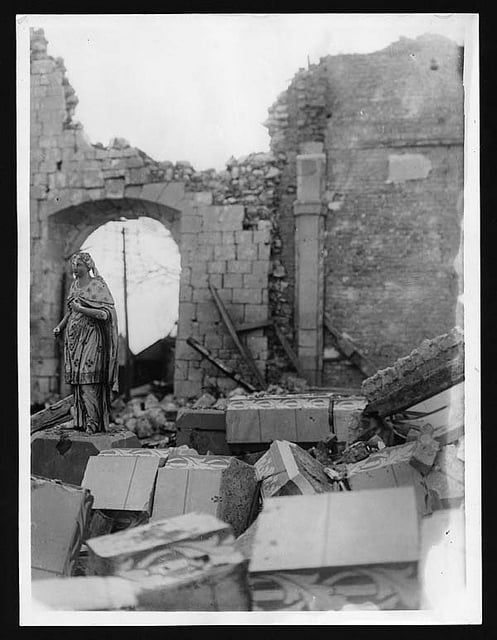
Gold and silver grew tarnished in huge safes that none wished to rifle, banknotes became mildewed, damp and fungus crept into the museums and picture galleries, and in the whole of Great Britain there was none to grieve. Every living man and woman was back at the work of their ancestors, praying once more to Ceres or Demeter, working with bent back to produce the first essentials of life.
Each individual must produce until such time as there was once more a superfluity, until barns were filled and wealth re-created, until the strong had seized from the weak and demanded labour in return for the use of the stolen instrument, until civilization had sprung anew from the soil.
Meanwhile London was not a city of the dead, but a dead city.
RADIUM AGE SCIENCE FICTION: “Radium Age” is HILOBROW’s name for the 1904–33 era, which saw the discovery of radioactivity, the revelation that matter itself is constantly in movement — a fitting metaphor for the first decades of the 20th century, during which old scientific, religious, political, and social certainties were shattered. This era also saw the publication of genre-shattering writing by Edgar Rice Burroughs, Sax Rohmer, E.E. “Doc” Smith, Jack London, Arthur Conan Doyle, Aldous Huxley, Olaf Stapledon, Karel Čapek, H.P. Lovecraft, Charlotte Perkins Gilman, Yevgeny Zamyatin, Philip Gordon Wylie, and other pioneers of post-Verne/Wells, pre-Golden Age “science fiction.” More info here.
HILOBOOKS: The mission of HiLoBooks is to serialize novels on HiLobrow; and also, as of 2012, operating as an imprint of Richard Nash’s Cursor, to reissue Radium Age science fiction in beautiful new print editions. So far, we have published Jack London’s The Scarlet Plague, Rudyard Kipling’s With the Night Mail (and “As Easy as A.B.C.”), Arthur Conan Doyle’s The Poison Belt, H. Rider Haggard’s When the World Shook, Edward Shanks’s The People of the Ruins, William Hope Hodgson’s The Night Land, and J.D. Beresford’s Goslings. Forthcoming: E.V. Odle’s The Clockwork Man, Cicely Hamilton’s Theodore Savage, and Muriel Jaeger’s The Man with Six Senses. For more information, visit the HiLoBooks homepage.
SERIALIZED BY HILOBOOKS: Jack London’s The Scarlet Plague | Rudyard Kipling’s With the Night Mail (and “As Easy as A.B.C.”) | Arthur Conan Doyle’s The Poison Belt | H. Rider Haggard’s When the World Shook | Edward Shanks’ The People of the Ruins | William Hope Hodgson’s The Night Land | J.D. Beresford’s Goslings | E.V. Odle’s The Clockwork Man | Cicely Hamilton’s Theodore Savage | Muriel Jaeger’s The Man With Six Senses | Jack London’s “The Red One” | Philip Francis Nowlan’s Armageddon 2419 A.D. | Homer Eon Flint’s The Devolutionist | W.E.B. DuBois’s “The Comet” | Edgar Rice Burroughs’s The Moon Men | Charlotte Perkins Gilman’s Herland | Sax Rohmer’s “The Zayat Kiss” | Eimar O’Duffy’s King Goshawk and the Birds | Frances Hodgson Burnett’s The Lost Prince | Morley Roberts’s The Fugitives | Helen MacInnes’s The Unconquerable | Geoffrey Household’s Watcher in the Shadows | William Haggard’s The High Wire | Hammond Innes’s Air Bridge | James Branch Cabell’s Jurgen | John Buchan’s “No Man’s Land” | John Russell’s “The Fourth Man” | E.M. Forster’s “The Machine Stops” | John Buchan’s Huntingtower | Arthur Conan Doyle’s When the World Screamed | Victor Bridges’ A Rogue By Compulsion | Jack London’s The Iron Heel | H. De Vere Stacpoole’s The Man Who Lost Himself | P.G. Wodehouse’s Leave It to Psmith | Richard Connell’s “The Most Dangerous Game” | Houdini and Lovecraft’s “Imprisoned with the Pharaohs” | Arthur Conan Doyle’s “The Sussex Vampire.”
ORIGINAL FICTION: HILOBROW has serialized three novels: James Parker’s The Ballad of Cocky The Fox (“a proof-of-concept that serialization can work on the Internet” — The Atlantic); Karinne Keithley Syers’s Linda Linda Linda (which includes original music); and Robert Waldron’s roman à clef The School on the Fens. We also publish original stories and comics. These include: Matthew Battles’s stories “Gita Nova“, “Makes the Man,” “Imago,” “Camera Lucida,” “A Simple Message”, “Children of the Volcano”, “The Gnomon”, “Billable Memories”, “For Provisional Description of Superficial Features”, “The Dogs in the Trees”, “The Sovereignties of Invention”, and “Survivor: The Island of Dr. Moreau”; several of these later appeared in the collection The Sovereignties of Invention | Peggy Nelson’s “Mood Indigo“, “Top Kill Fail“, and “Mercerism” | Annalee Newitz’s “The Great Oxygen Race” | Flourish Klink’s Star Trek fanfic “Conference Comms” | Charlie Mitchell’s “A Fantasy Land” | Charlie Mitchell’s “Sentinels” | Joshua Glenn’s “The Lawless One”, and the mashup story “Zarathustra vs. Swamp Thing” | Adam McGovern and Paolo Leandri’s Idoru Jones comics | John Holbo’s “Sugarplum Squeampunk” | “Another Corporate Death” (1) and “Another Corporate Death” (2) by Mike Fleisch | Kathryn Kuitenbrouwer and Frank Fiorentino’s graphic novel “The Song of Otto” (excerpt) | John Holbo’s graphic novel On Beyond Zarathustra (excerpt) | “Manoj” and “Josh” by Vijay Balakrishnan | “Verge” by Chris Rossi, and his audio novel Low Priority Hero | EPIC WINS: THE ILIAD (1.408-415) by Flourish Klink | EPIC WINS: THE KALEVALA (3.1-278) by James Parker | EPIC WINS: THE ARGONAUTICA (2.815-834) by Joshua Glenn | EPIC WINS: THE MYTH OF THE ELK by Matthew Battles | TROUBLED SUPERHUMAN CONTEST: Charles Pappas, “The Law” | CATASTROPHE CONTEST: Timothy Raymond, “Hem and the Flood” | TELEPATHY CONTEST: Rachel Ellis Adams, “Fatima, Can You Hear Me?” | OIL SPILL CONTEST: A.E. Smith, “Sound Thinking | LITTLE NEMO CAPTION CONTEST: Joe Lyons, “Necronomicon” | SPOOKY-KOOKY CONTEST: Tucker Cummings, “Well Marbled” | INVENT-A-HERO CONTEST: TG Gibbon, “The Firefly” | FANFICTION CONTEST: Lyette Mercier’s “Sex and the Single Superhero”
